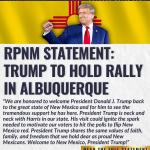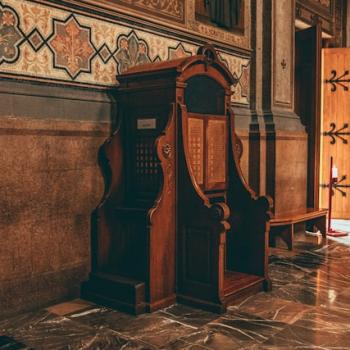Today is Election Day. And Christian content creators, bloggers, and pastors are sending a clear message: no matter who is president, Jesus is King.

Christ’s Kingship is the very foundation of Christian politics. He does not lead or rule like earthly kings do. Earthly rulers seek their self-interest. They sacrifice the people to get their way.
Israel’s monarchy is a prime example of this. In the book of 1 Samuel, we see how the assembly of Israel rejected God’s Kingship because they wanted to be ruled like the nations. In 1 Samuel 8, Israel lifts up this petition to God.
This was at a time when Samuel was getting old. Samuel, a judge chosen by God, had previously guided Israel in obedience to God’s laws. But Israel’s elders petitioned Samuel, saying,
Behold, you are old and your sons do not walk in your ways. Now appoint for us a king to judge us like all the nations (1 Sam. 8:5, ESV).
Samuel brought this up with God. This request deeply troubled him. In prayer, God responded to Samuel.
Obey the voice of the people in all that they say to you, but they have rejected me from being king over them. According to all the deeds that they have done, from the day I brought them up out of Egypt even to this day, forsaking me and serving other gods, so they are also doing to you. Now then, obey their voice; only you shall solemnly warn them and show them the ways of the king who shall reign over them (1 Sam. 8:7-9).
What Jesus’s Kingship Is Not
We see that originally, Israel as the people of God had God as their king. But by seeking to be like the nations, they forfeited God’s direct rule. This came with serious consequences. These consequences show us what Jesus’s Kingship does not mean.
Samuel told Israel what the consequences would be of having a man rule over them:
- Forced enlistment of Israel’s sons
- Hard labor to take care of the king’s harvest and fund the king’s weapons of war
- Stealing daughters away to labor in producing perfume and food
- Taxation of the best of the people’s crops
- Enslavement to the king
He ends this list by saying,
And in that day you will cry out because of your king, whom you have chosen for yourselves, but the Lord will not answer you in that day (1 Sam. 8:18).
We see here the antithesis of what Jesus’s Kingship is. Earthly kings take and exploit. They tax and steal the best of what the people labor to create. Whereas sons and daughters traditionally joined in the labor of their parents, the king forces them to do his work, removing them from their families and restricting their labor to his palace.
What Jesus’s Kingship Is
On the other hand, what is Jesus’s Kingship, positively speaking? We see His Kingship throughout the Gospels. What comes to mind most starkly is Jesus’s statement about what the Son of Man came to do: not to be served but to serve (Mark 10:45). Christ capitulates and gives up His power as King of the Universe. He enters into our world. God takes on flesh to live as we do and suffer on our behalf.
Our King dies for His people, even for His enemies.
Christ’s Kingship turns earthly forms of rule upside down. This is why when Christ stands before Pilate, he utters these famous words:
My kingdom is not of this world. If my kingdom were of this world, my servants would have been fighting, that I might not be delivered over to the Jews. But my kingdom is not from the world (John 18:36).
Any earthly ruler, when arrested and put in trial, would fight to save their image. They would call their followers to revolt, to commit insurrection to save them. They would slander their opponents. But Christ? Christ asserted His supremacy even over Rome, the world’s superpower at the time. His Kingdom is not threatened by Rome, nor is it threatened by any plot of man today.
Jesus and Presidents
But the richness of Christ’s Kingship is often lost on American hearts. The American Church has long been socialized into correlating being Christian with voting a certain way. Though, I must qualify this, as many forget to do. The white American evangelical church rather than American Christians in general has, since the 40s, aligned itself with the Republican Party in a blind sighted and unbiblical way.
This decades-long process (some trace this back to the 70s with Falwell’s Moral Majority; others like Lydia Bean trace this back to the 40s) has produced a partisan dogmatism that is woeful and regrettable. “If you do not vote Republican, you cannot be Christian.”
The issue tying these Christians to the Republican Party has changed over time. Initially, the bond was forged over opposition to desegregation after Brown v. Board (1954). Later, it was over the issue of abortion, which evangelicals prior to Roe v. Wade (1973) did not care much for. Now, with the Trump era, it is over the issue of immigration.
And it is out of this context of politicization that, as more analysts such as 538 predict that Vice President Kamala Harris will win the race, we hear more and more politically conservative Christian voices saying,
No matter who is president, Jesus is King.
But do these voices really understand what Jesus’s Kingship is about? Why don’t these same Christians say this when Republican politicians win? Could it be that they have conflated party with Kingdom? Or could it be that they want the Republican Party to be in power; and if that doesn’t work, then Christ’s Kingship is the next best thing?
Post by @jesusunfollowerView on Threads
Conclusion
Too many in the evangelical church, white or not, have over-prioritized the Republican Party platform. As long as Republicans win elections, we hear nothing of Christ’s Kingship. But as soon as the Republican candidate is projected to lose, that is the moment when we hear appeals to it.
The argument of this article is not that these brothers and sisters don’t believe that Jesus is King at all. Rather, the point is that they have lost the meaning of Kingship. Jesus is Lord of the Universe, eternal and undefeatable. His power is unmatched, and His Kingdom lasts forever and ever.
In the face of this sheer power, this servant-king, this God-in-flesh shows us that culture war flashpoints and criminals running for office are not the ultimate promises that we Christians hope for. Christ’s Kingship is more than just partisan domination. This confusion of who Jesus is and how He is King is exactly the sentiment that makes so many Christians susceptible to movements which tell them that lost elections are rigged, that the “deep state” is out to get their political messiah, that a felon is the hope of the Church.
Let us not choose Barabbas, the insurrectionist offered to the angry throng who seek earthly liberation. Let us instead choose Jesus, who gives Himself up for us so that we might be set free forever. Amen.
Concluding Postscript
To avoid the charge of political dogmatism that has so long characterized the Religious Right, I must clarify myself here. I do believe that Christians can vote or lean either way according to their convictions. The issue lies in how one’s prioritization of one’s party eclipses one’s adoration of Christ. It is not whether one votes Left or Right, but whether the Left or Right detract the believer from living out her hope that she has from Above.













